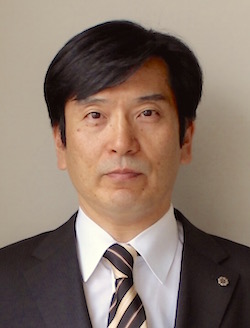 Kimio Wada
Kimio Wada
Vice Mayor
Tsurugashima City, Saitama Prefecture
Public Policy Program (’99)
Please tell us about your career path so far. What is your area of specialization and how did you come to work in this area?
I started working at the Saitama Prefectural Office in 1987. Among others, I was in charge of promoting decentralization as well as supporting the internationalization of Saitama Prefecture. In particular, for a number of years I was involved in the so-called “Saitama Asia Project” that aims to help solve the many challenges facing countries in Asia by taking advantage of the strengths of Saitama Prefecture.
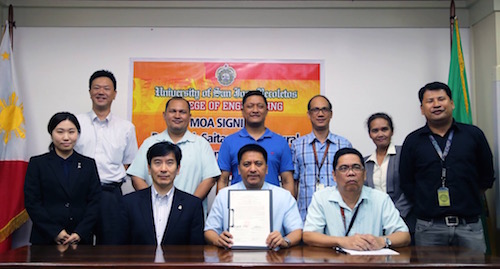
MOU signing ceremony with the College of Engineering, San Jose-Recoletos in Cebu City, Philippines, November 2015.
For instance, we have provided technical assistance for capacity development in operation and maintenance of water purification plants in Thailand, and contributed to the human resource development of college students in the Philippines.
Building on this experience and in recognition of my work, I was appointed as Vice-Mayor of Tsurugashima City in April this year.
You have recently become Vice Mayor of Tsurugashima City. What are your main responsibilities and duties?
Along with supporting the Mayor, as Vice Mayor one of my main responsibilities is to make the necessary judgments regarding the city’s planning and policies while overseeing the relationships between the departments involved.
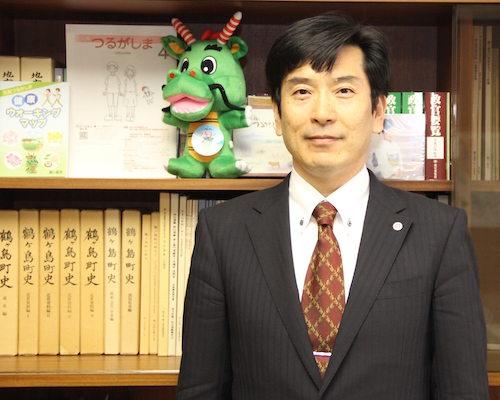
Kimio Wada just after his inauguration as Vice Mayor of Tsurugashima City, April 2016
In your current capacity, what do you see as the main opportunities and challenges for Tsurugashima City over the course of the next five to ten years? What are you hoping to achieve during your term of office?
Tsurugashima has good residential areas with lots of nature nearby. Moreover, it is easily accessible as it is at the intersection of two major highways. Taking maximum advantage of these benefits, a future challenge is to achieve regional development consistent with an aging society that we will be facing from now on.
Also, building on our extensive international experience we would like to proactively spread Tsurugashima’s charm overseas. This year, the Suneori Amagoi Rain Festival, a major event that is held only once every four years is scheduled for August 7. I would like to use this event to enhance the appeal of Tsurugashima, both inside and outside Japan. For more information please refer to the Tsurugashima City website.
What is the most important thing you got out of your studies here, and how has your experience at GRIPS/GSPS prepared you for future endeavours?
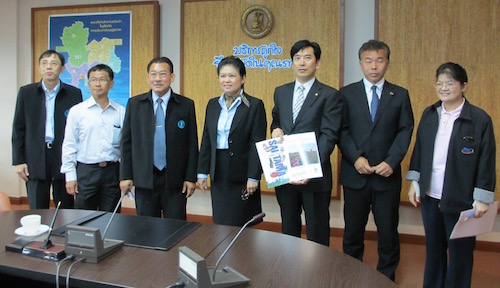
With Provincial Waterworks Authority President, Thailand, 2012
My exchanges with a large number of international students coming from all continents has certainly broadened my view of the world and changed my awareness and approach to work. In this day and age, it is important even for people working in local governments to have a broad worldview and to think globally.
What is your favorite thing to do when you are not working? And how do you stay connected with your former fellow students?
These days, I connect through Facebook with many former students that I became friends with during my studies at GSPS, and likewise with the friends I made in Thailand and the Philippines when working together on projects during my time at the Saitama Prefectural Government. While broadening my circle of friends I also became connected with GRIPS Alumni Director Karin Hillen and the GRIPS/GSPS alumni group on Facebook. I am still in close contact with former fellow students like Anwar S. Kariem from Indonesia and Prakash Kumar from India. In this way, while mingling with my overseas friends is one of my hobbies, it is also a great opportunity to learn about their culture and customs and to keep up-to-date with the current state of affairs in their countries.
What are some of your fondest memories of your time spent at GRIPS/GSPS?
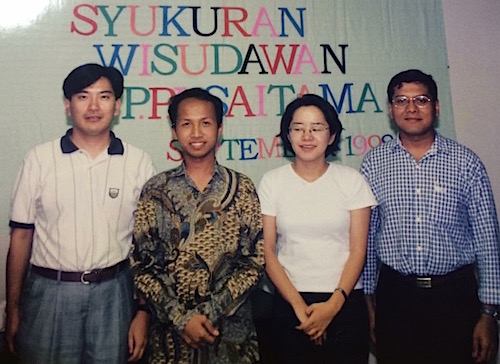
With GSPS fellow students at Saitama University, 1998
Enjoying ‘hanami’ (cherry blossom viewing) with my fellow students, making short trips to onsen (hot springs) and inviting friends to my home were great opportunities to socialize with international students and they are among some of the dearest memories.
If you could give one piece of advice to anyone considering studying at GRIPS what would it be?
Academic research is very important, but the great environment GRIPS offers for exchanging ideas and making friends with many international students is something you will benefit from for the rest of your personal and professional life.
How would you like to maintain involved with the School? What do you expect from GRIPS as an alumnus?
It would be great if we had more opportunities to meet and exchange with our former professors, like my thesis advisor and current Vice-President of GRIPS, Professor Kiyotaka Yokomichi. In that respect, I would also like to make an effort into making such gatherings happen.





